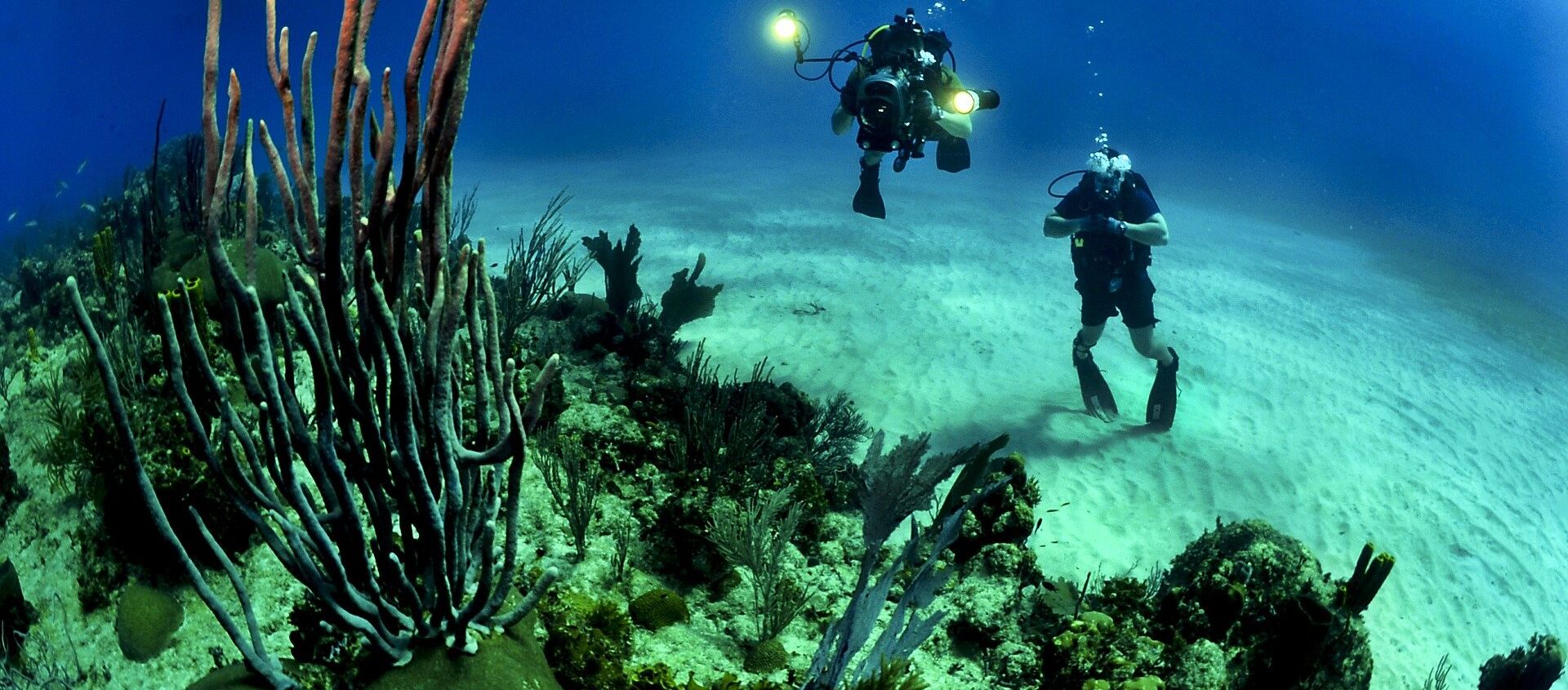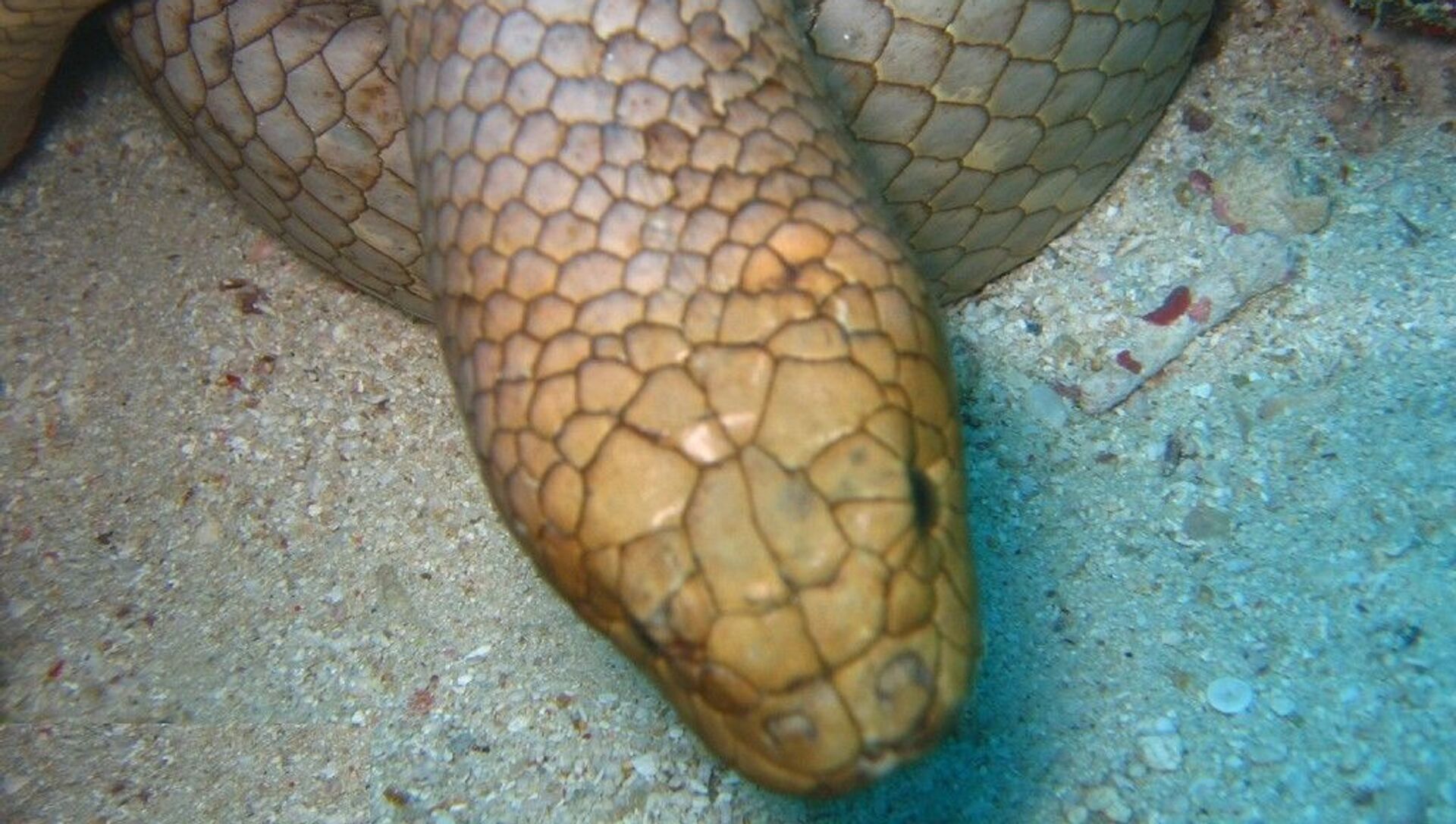https://sputnikglobe.com/20210820/so-you-come-here-often-sea-snakes-attacking-divers-are-just-looking-for-love-scientists-say-1083672389.html
So, You Come Here Often? Sea Snakes 'Attacking' Divers Are Just 'Looking for Love,' Scientists Say
So, You Come Here Often? Sea Snakes 'Attacking' Divers Are Just 'Looking for Love,' Scientists Say
Sputnik International
The study’s senior author advised that, in case of an encounter with a sea snake, a diver should not swim away because they are too fast – instead, allow the... 20.08.2021, Sputnik International
2021-08-20T19:02+0000
2021-08-20T19:02+0000
2021-08-20T19:09+0000
science & tech
society
newsfeed
ocean
sea
snakes
behavior
https://cdn1.img.sputnikglobe.com/img/07e5/08/14/1083672805_0:188:1024:768_1920x0_80_0_0_8e6ba0a72b3b03e856b2269162bf1b37.jpg
A new study conducted by researchers in Australia offers a possible explanation for apparently unprovoked attacks by venomous sea snakes on divers.According to the Smithsonian magazine, numerous scuba divers in areas such as the Great Barrier Reef previously reported run-ins with such snakes that "sometimes come hurtling out of the blue swimming in rapid zig-zags straight at the person." These attacks, however, "almost never" end up with divers getting bitten by these venomous creatures.The team’s eventual discoveries were made possible thanks to the data obtained by Shine’s co-author Tim Lynch, a scientist from Australia’s Commonwealth Scientific and Industrial Research Organisation who, back in 1994, spent 250 hours “scuba diving around the Keppel Islands in the southern Great Barrier Reef to study olive sea snake behaviour for his PhD thesis.” He recorded his encounters with these creatures and noted “whether they approached him and for how long within individual 30-minute periods.”During the study, the researchers concluded that all of the charges performed by snakes towards the diver occurred during the creatures’ breeding season, and that all such approaches by male snakes occurred either after they had confronted a rival male snake or were in the process of chasing a female in the hope of mating with her.Meanwhile, all of the female snakes that charged the diver were being chased by male snakes.As for instances when a female snake rushed towards the diver, the study suggests that it was due to the former seeking refuge from a male suitor chasing her, likely regarding the human body as potential cover."People almost universally interpreted these behaviours as aggression," Shine said. “Snakes are often seen as these malevolent beings intent on mayhem, but in this case really they’re just looking for love."He also said that sea snakes move underwater much faster than humans, so trying to swim away from them would be a waste of time."Don’t try to hit the snake or fend it off because that could upset it. Just give the snake a chance to figure out who you are and once they do they will likely head off," Shine said.
https://sputnikglobe.com/20210225/when-nature-gets-the-urge-sight-of-phallic-shaped-sea-creature-leaves-netizens-in-stitches-1082187489.html
Sputnik International
feedback@sputniknews.com
+74956456601
MIA „Rossiya Segodnya“
2021
News
en_EN
Sputnik International
feedback@sputniknews.com
+74956456601
MIA „Rossiya Segodnya“
Sputnik International
feedback@sputniknews.com
+74956456601
MIA „Rossiya Segodnya“
science & tech, society, newsfeed, ocean, sea, snakes, behavior
science & tech, society, newsfeed, ocean, sea, snakes, behavior
So, You Come Here Often? Sea Snakes 'Attacking' Divers Are Just 'Looking for Love,' Scientists Say
19:02 GMT 20.08.2021 (Updated: 19:09 GMT 20.08.2021) The study’s senior author advised that, in case of an encounter with a sea snake, a diver should not swim away because they are too fast – instead, allow the creature “a chance to figure out who you are.” Romantic.
A new study conducted by researchers in Australia offers a possible explanation for apparently unprovoked attacks by venomous sea snakes on divers.
According to the Smithsonian magazine, numerous scuba divers in areas such as the Great Barrier Reef previously reported run-ins with such snakes that "sometimes come hurtling out of the blue swimming in rapid zig-zags straight at the person." These attacks, however, "almost never" end up with divers getting bitten by these venomous creatures.
"Wild animals don’t attack people without good reason," said Rick Shine, an evolutionary biologist at Macquarie University in Australia and senior author of the study. "Snakes on land almost never attack people but there were all these stories about sea snakes doing it. Why the hell would a sea snake race towards a person underwater?"
The team’s eventual discoveries were made possible thanks to the data obtained by Shine’s co-author Tim Lynch, a scientist from Australia’s Commonwealth Scientific and Industrial Research Organisation who, back in 1994, spent 250 hours “scuba diving around the Keppel Islands in the southern Great Barrier Reef to study olive sea snake behaviour for his PhD thesis.” He recorded his encounters with these creatures and noted “whether they approached him and for how long within individual 30-minute periods.”
During the study, the researchers concluded that all of the charges performed by snakes towards the diver occurred during the creatures’ breeding season, and that all such approaches by male snakes occurred either after they had confronted a rival male snake or were in the process of chasing a female in the hope of mating with her.

25 February 2021, 19:00 GMT
Meanwhile, all of the female snakes that charged the diver were being chased by male snakes.
"Male sea snakes have trouble locating females in the first place," Shine remarked. "And if the girl runs away and the boy loses touch with her, he might go hurtling over towards any shape he sees in the water. Then once the snake gets there it takes him a little while to realise the large object isn’t the girl he was pursuing."
As for instances when a female snake rushed towards the diver, the study suggests that it was due to the former seeking refuge from a male suitor chasing her, likely regarding the human body as potential cover.
"People almost universally interpreted these behaviours as aggression," Shine said. “Snakes are often seen as these malevolent beings intent on mayhem, but in this case really they’re just looking for love."
He also said that sea snakes move underwater much faster than humans, so trying to swim away from them would be a waste of time.
"Don’t try to hit the snake or fend it off because that could upset it. Just give the snake a chance to figure out who you are and once they do they will likely head off," Shine said.


